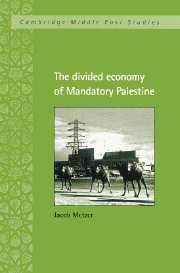Book contents
- Frontmatter
- Contents
- List of figures
- List of tables
- Preface
- Acknowledgments
- Note on numbers
- 1 Palestine's economic structure and performance: introduction and overview
- 2 The peoples of Palestine: a comparative account
- 3 Patterns and characteristics of Palestine's (Jewish) immigration
- 4 Production resources in a divided economy: land, capital, and labor
- 5 Production and trade
- 6 Public sectors in Palestine's economic life
- 7 Postscript: some observations on economic coexistence in ethno-national adversity
- Appendix
- References
- Index
- Cambridge Middle East Studies
1 - Palestine's economic structure and performance: introduction and overview
Published online by Cambridge University Press: 18 December 2009
- Frontmatter
- Contents
- List of figures
- List of tables
- Preface
- Acknowledgments
- Note on numbers
- 1 Palestine's economic structure and performance: introduction and overview
- 2 The peoples of Palestine: a comparative account
- 3 Patterns and characteristics of Palestine's (Jewish) immigration
- 4 Production resources in a divided economy: land, capital, and labor
- 5 Production and trade
- 6 Public sectors in Palestine's economic life
- 7 Postscript: some observations on economic coexistence in ethno-national adversity
- Appendix
- References
- Index
- Cambridge Middle East Studies
Summary
One country – one economy, or two peoples – two economies?
Any student of Palestine's economic history is inevitably confronted with the need to characterize the country's economy during the three decades of British rule (1919–48). At the heart of the matter lies the question whether Palestine should be viewed as a single economy or as a segmented entity, composed of two ethno-national economies, one Arab and one Jewish, coexisting under a single administrative aegis of the Mandate government.
In the uneasy history of Arab-Jewish coexistence in adversity, each of these two viewpoints had distinct and explicitly acknowledged political connotations. The “single economy” approach, adopted mainly by Arabs, was consistent with their political views and objectives, whereby Palestine was a single entity in which Jews, while entitled to individual rights, were by no means supposed to have any separate collective standing, let alone autonomy. The Jewish-Zionist position adopted the notion of a separate Jewish economy and promoted it both as a plan of action, while striving to form an autonomous body politic based on the “National Home” postulate, and as a factually justifiable distinction for reference and analysis (Metzer, 1982).
Another aspect of the debate, which has kept it alive in the scholarly literature, has to do with some methodological ambiguities as to what exactly constitutes an “economy,” and what are the practical implications of that concept. These unresolved issues have led to two broadly defined schools of thought. One approach views the unified economic administration of the Mandatory government and the economic relations between Arabs and Jews as dominating attributes warranting the treatment of Palestine as a single economy.
- Type
- Chapter
- Information
- The Divided Economy of Mandatory Palestine , pp. 1 - 27Publisher: Cambridge University PressPrint publication year: 1998



